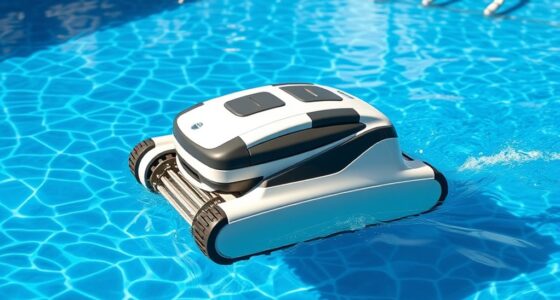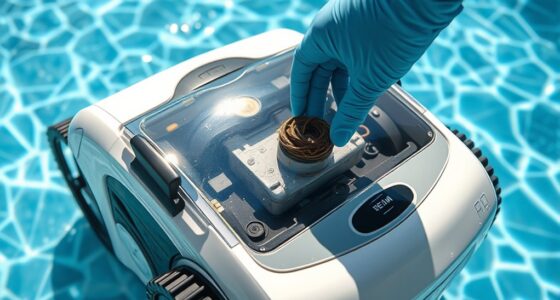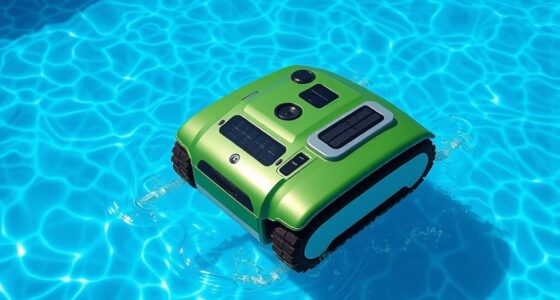Cordless robotic pool cleaners give you more freedom of movement, making them perfect for quick cleanups and smaller pools. They’re easier to maneuver and eliminate cable clutter, but they rely on batteries, which can limit runtime and power. Corded models deliver stronger suction and steady performance for larger pools, with less maintenance. Your choice depends on your pool size, cleaning needs, and convenience preferences—keep exploring to find the best fit for your pool.
Key Takeaways
- Corded models offer higher suction power and consistent performance, ideal for large or stubborn debris in pools.
- Cordless cleaners provide greater mobility and ease of use, perfect for small pools or quick cleaning tasks.
- Battery life and charging time are crucial for cordless units, affecting runtime and convenience during cleaning sessions.
- Corded models typically have lower upfront costs and maintenance needs, while cordless options tend to be more expensive initially.
- The choice depends on pool size, location, and cleaning frequency, with corded suited for larger or outdoor pools and cordless for portability.
Power and Performance Differences
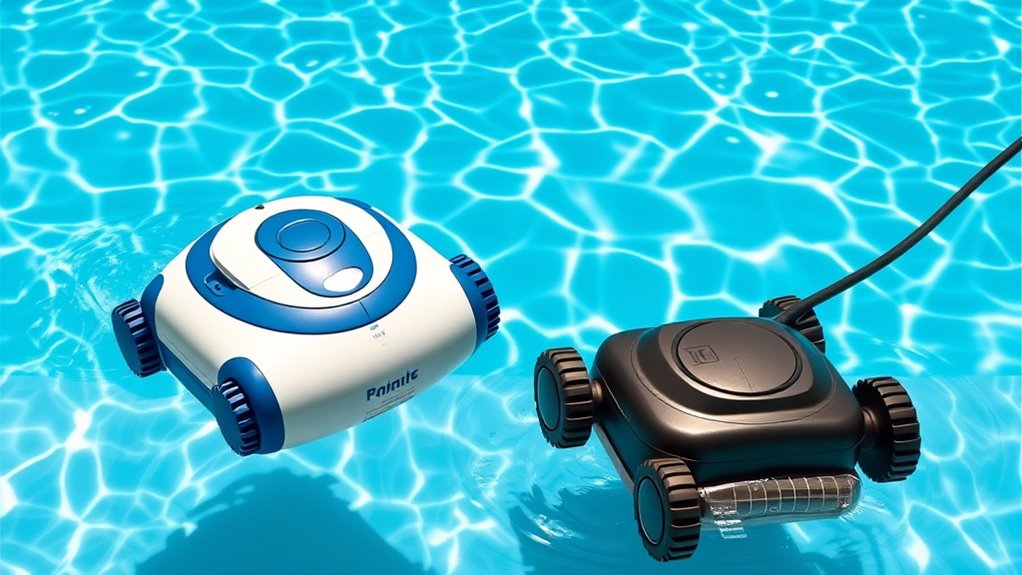
When comparing cordless and corded robotic pool cleaners, the power and performance differences are significant. Corded models often deliver higher suction power, which translates into better cleaning efficiency, especially for stubborn debris and dirt. Their continuous power supply guarantees consistent performance, allowing them to cover larger areas effectively. In contrast, cordless cleaners rely on batteries, which can limit suction power and reduce overall cleaning efficiency. While cordless units offer greater freedom of movement, they might struggle with heavy debris or extensive pool coverage due to power constraints. Ultimately, if you need thorough cleaning with strong suction, a corded robotic cleaner typically outperforms a cordless one in power and performance. Additionally, power sources play a crucial role in determining overall cleaning capabilities. Furthermore, battery capacity impacts how long a cordless cleaner can operate before needing a recharge, influencing its overall effectiveness during cleaning sessions. Proper power management is essential to optimize cleaning cycles and ensure consistent results across different pool conditions.
Mobility and Convenience

Cordless robotic pool cleaners excel in mobility and convenience because they eliminate the hassle of managing power cords. Without cords to worry about, you can easily maneuver the cleaner around the pool, reaching all areas without manual operation constraints. This freedom allows for quicker setup and more efficient cleaning sessions. Their sleek, aesthetic design also adds to the overall convenience, blending seamlessly with your pool environment and avoiding clutter. You won’t need to constantly untangle or reposition cords, saving time and effort. Plus, their lightweight build makes handling and storage simple. Additionally, portable designs enable you to use them in various pool sizes and locations, further enhancing their versatility. The reduction of potential trip hazards also contributes to a safer cleaning experience. Furthermore, advanced battery technology provides longer cleaning cycles and quicker recharge times, increasing their overall efficiency. The integration of smart navigation systems enhances their ability to cover the entire pool effectively. Improved connection stability prevents interruptions during cleaning, ensuring thorough coverage. Overall, cordless models offer greater flexibility, making pool maintenance less of a chore and more of a hassle-free experience.
Battery Life and Charging Considerations
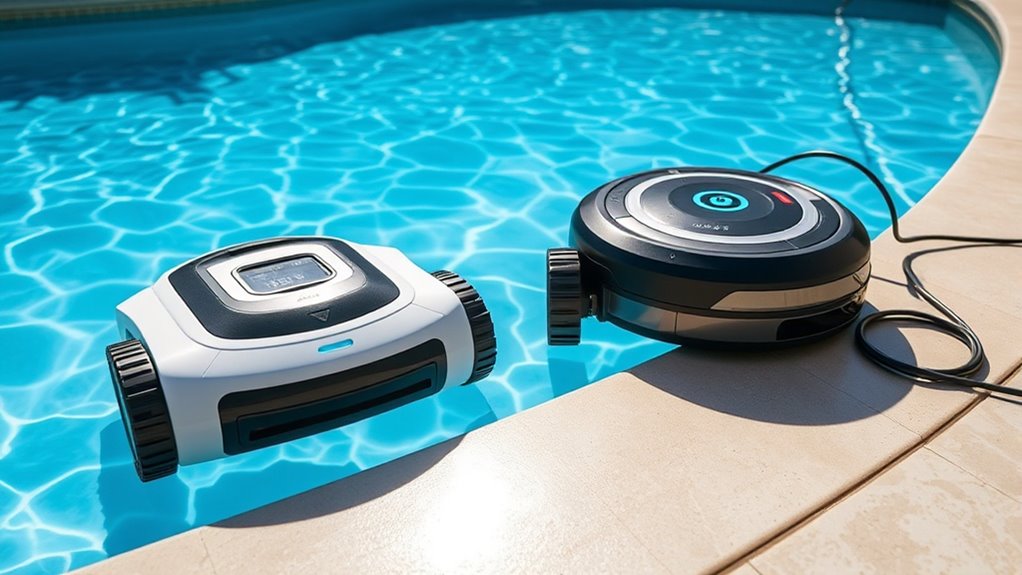
Battery life and charging considerations are crucial factors to weigh when choosing a cordless robotic pool cleaner, as they directly impact how long you can clean without interruption. A longer battery lifespan means more cleaning time between charges, saving you effort and frustration. Pay attention to the charging duration; shorter times allow you to get back to cleaning faster. Here are key points to consider:
Choose a cordless robotic pool cleaner with long battery life and quick charging for hassle-free cleaning sessions.
- Check the battery lifespan—aim for models with durable, high-quality batteries.
- Determine the charging duration—look for quick-charging features for convenience.
- Consider the overall runtime—ensure it matches your pool size and cleaning needs.
- Understanding the sound healing science behind certain charging technologies can help optimize battery performance and longevity. Additionally, selecting models with advanced battery management systems can further enhance battery health and extend usable life. Incorporating smart charging features can also prevent overcharging and preserve battery longevity.
Balancing these factors ensures your cordless cleaner is ready when you need it, providing efficient and uninterrupted cleaning sessions.
Cost and Maintenance Factors
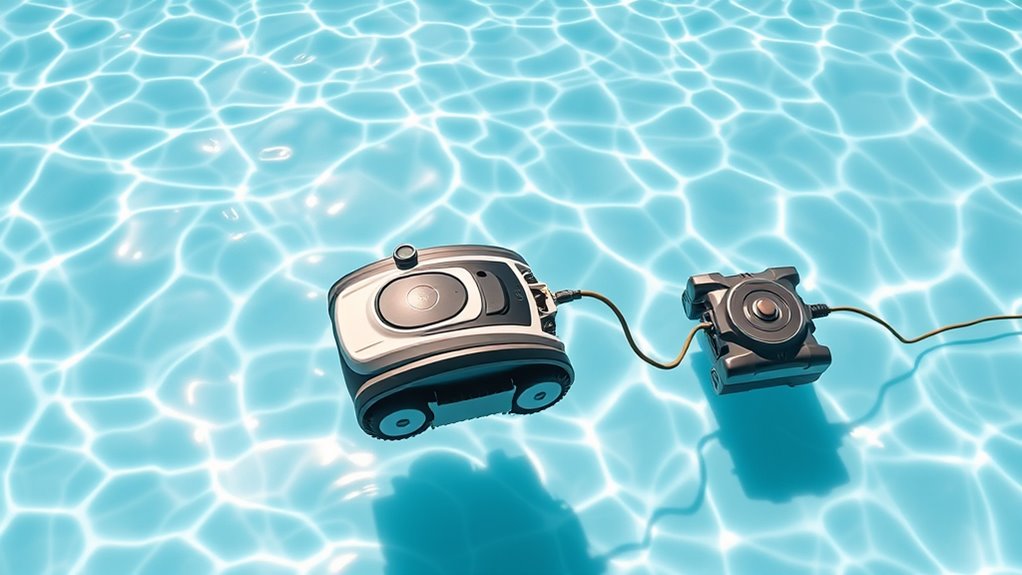
Considering the initial purchase price and ongoing expenses is essential when choosing a robotic pool cleaner, as these costs can substantially influence your overall investment. Pricing variations between cordless and corded models can be significant, with cordless options often costing more upfront due to advanced battery technology. However, corded cleaners typically have lower maintenance costs since they lack batteries that degrade over time. You’ll want to factor in maintenance costs like replacing filters, brushes, or batteries, which can add up. Cordless cleaners might require more frequent battery replacements, increasing long-term expenses. On the other hand, corded models generally have fewer parts prone to wear, leading to lower ongoing maintenance. Additionally, understanding agent programs and how they impact your data privacy can help you make informed decisions about your smart devices, including robotic pool cleaners. Remember that battery lifespan significantly affects the long-term costs of cordless models, making it an important consideration. It’s also worth noting that charging times can vary between models, influencing convenience and usability. Weigh these factors carefully to ensure the cleaner you choose fits your budget both initially and over its lifespan.
Ideal Usage Scenarios
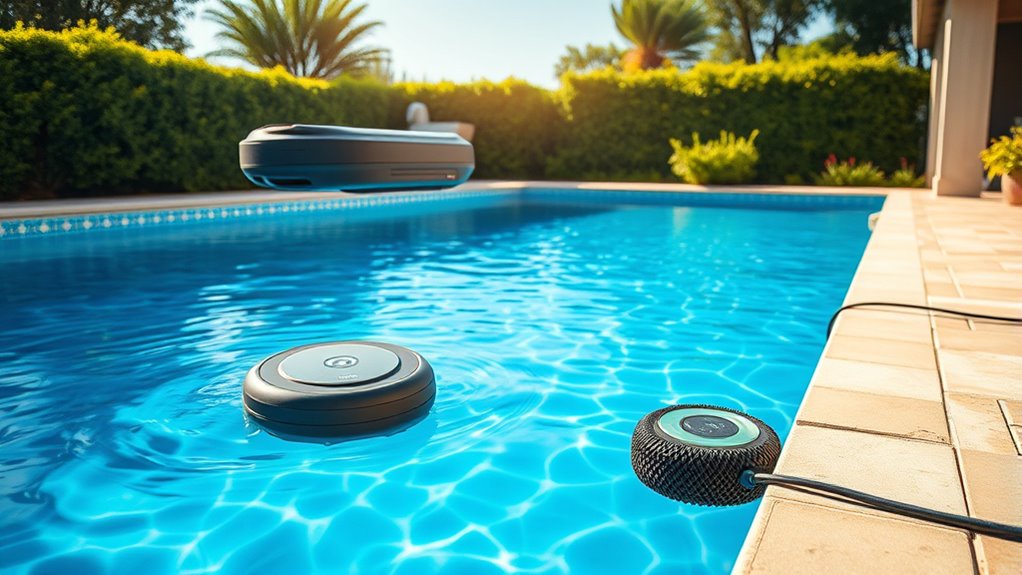
The choice between cordless and corded robotic pool cleaners often depends on how and where you’ll use them. For small to medium pools, both types work well, but your pool size influences your pick. Cordless cleaners are perfect for quick cleanups in smaller pools or spas, especially if you want portability. If you have a large pool or difficult water type, like heavily chlorinated or mineral-rich water, a corded model with extended reach might be better. Consider the environment: outdoor pools with open access favor cordless units for convenience, while indoor pools benefit from corded models that won’t lose power. Think about your cleaning frequency and water conditions to select the ideal cleaner for your needs. Additionally, understanding the water conditions of your pool can help determine which type will perform more effectively over time.
Frequently Asked Questions
Which Type Is More Eco-Friendly?
You’re wondering which type is more eco-friendly, focusing on energy efficiency and environmental impact. A cordless robotic pool cleaner generally uses less energy because it operates with a rechargeable battery, reducing ongoing power consumption. In contrast, a corded model might draw more power continuously. By choosing a cordless option, you minimize energy use and lessen environmental impact, making it a smarter, greener choice for pool cleaning.
Are There Safety Concerns With Corded Models?
Think of the power cord as a leash guiding your robotic cleaner. While it keeps your device tethered, it also introduces potential risks. You should be mindful of power cord safety to avoid electrical hazards, like tripping or water exposure. Always inspect cords for damage, keep them away from swimmers, and guarantee proper grounding. This way, you enjoy a clean pool without risking electrical mishaps.
How Do Noise Levels Compare?
You wonder about noise levels and how they compare in robotic pool cleaners. Typically, cordless models tend to be quieter, offering less noise disruption during operation. The noise comparison shows that cordless cleaners often operate more efficiently and smoothly, making them more suitable if you want a quieter experience. Although both types are generally designed to be efficient, cordless models usually have slight efficiency differences favoring quieter, less intrusive cleaning.
Can They Operate on Uneven Pool Surfaces?
When it comes to uneven pool surfaces, surface traction plays a vital role. You’ll find that most robotic cleaners, whether cordless or corded, are designed to handle a variety of pool surfaces, but their effectiveness depends on their traction capabilities. Cordless models often offer more agility, allowing them to navigate tricky terrains better. So, if you have uneven surfaces, look for a cleaner with strong surface traction to guarantee thorough cleaning.
What Are the Warranty Differences?
When comparing warranties, you’ll find that coverage varies by brand and model. Typically, cordless pool cleaners offer shorter warranty periods but may include more extensive repair processes. Corded models often come with longer warranty coverage, making repairs straightforward and less costly. You should review each product’s warranty details to understand what’s covered, how long it lasts, and how the repair process works, ensuring you’re protected against unexpected issues.
Conclusion
Choosing between cordless and corded robotic pool cleaners depends on your needs. Cordless models offer unmatched mobility, letting you clean hard-to-reach areas easily. Did you know that cordless cleaners can operate for up to 2 hours on a single charge? This makes them perfect for larger pools or quick clean-ups. Ultimately, consider your pool size and cleaning frequency to select the best option—either way, you’ll enjoy sparkling waters with less effort.



